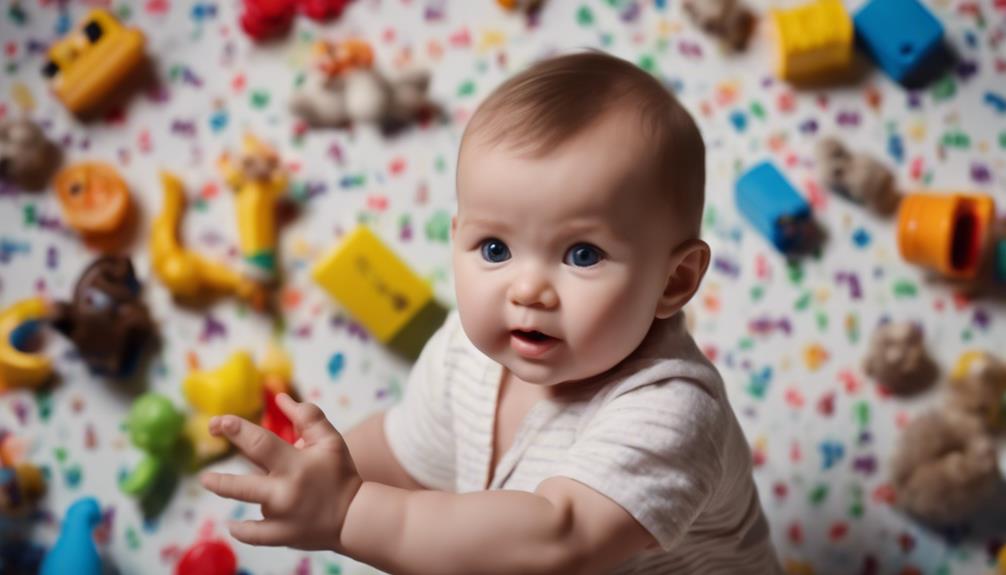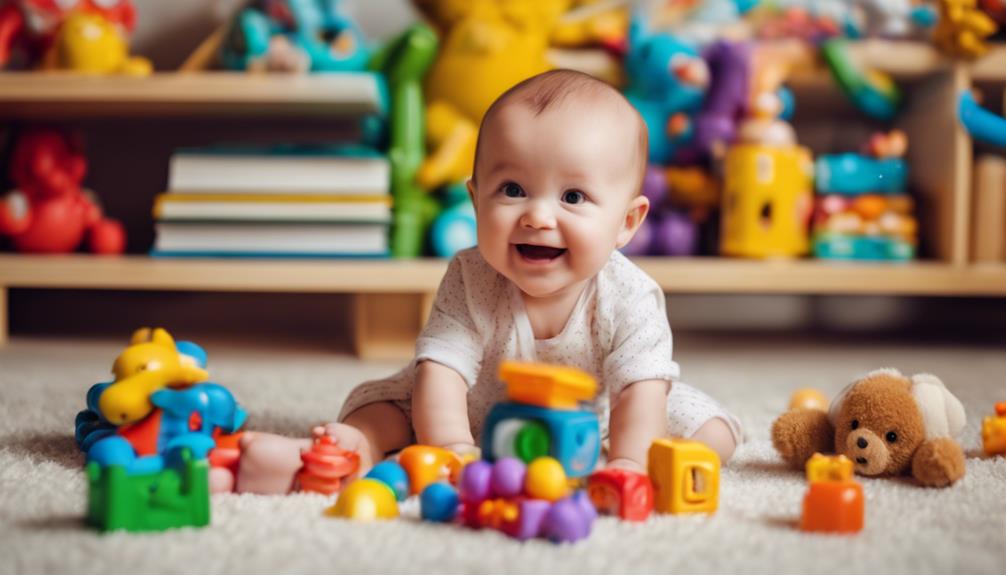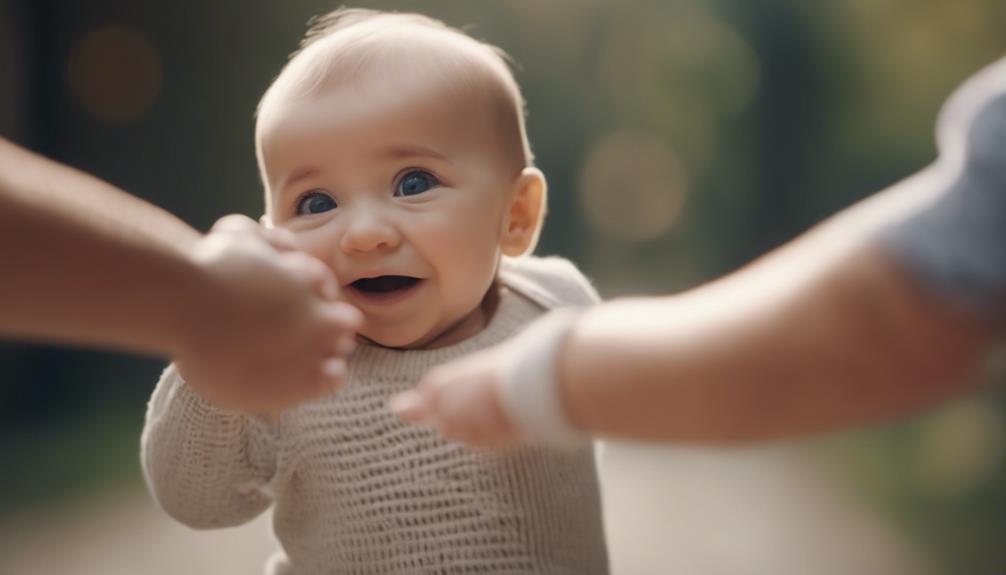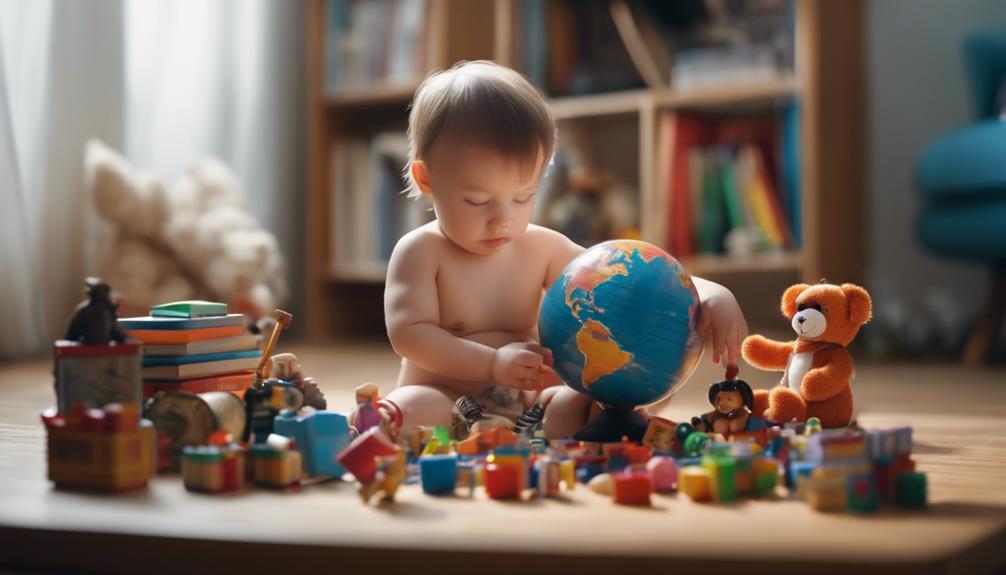Your infant expresses love by finding comfort in your familiar face, building emotional bonds from the very start. Engaging happily, demonstrating joy through movements, strengthens relationships. Looking for closeness, reaching out for cuddles and intimacy, shows trust and affection. Behaviors such as seeking physical touch and displaying separation anxiety enhance the bond. Trust and love are shown through sincere gestures like giving kisses. Recognizing these signals strengthens the emotional attachment with your baby.
Key Takeaways
- Seeking physical closeness and comfort signals love and trust.
- Displaying separation anxiety showcases deep attachment to caregivers.
- Joyful reactions and smiles indicate a strong emotional bond.
- Giving kisses around age one symbolizes affection and trust.
- Recognizing these signs strengthens the loving relationship with your baby.
Recognizing Familiar Faces
Recognizing familiar faces is a key indicator of your baby's affection towards you as their primary caregiver. Babies naturally gravitate towards the faces of those who provide them with care and comfort, seeking out the security and familiarity that these individuals represent. Through the ability to recognize parents' faces, infants begin to form an emotional bond that's foundational to their development.
When your baby locks eyes with you, it's not just a random act. Eye contact is a powerful tool for babies to establish connections and communicate their needs.
Newborns, astonishingly, can pick out their parents' faces from a crowd within weeks of birth. This recognition brings them a sense of being safe and secure in their environment, leading to moments of excitement and joy when they see familiar faces.
This joyous display is a clear sign of the love and affection your baby holds for you as their primary caregiver.
Engaging in Joyful Interactions

When your baby engages in joyful interactions with you, they express their deep emotional bond and affection through genuine displays of happiness and excitement. Your presence alone can make your little one light up with joy, showcasing their affectionate connection to you.
Here are some key ways in which babies demonstrate their genuine affection and happiness during these interactions:
- Babies respond enthusiastically to your facial expressions and gestures, showing their emotional connection through enthusiastic reactions.
- Your baby may bounce and wiggle with delight upon seeing you, expressing their happiness in a physical manner.
- Smiling intentionally in response to you is an early sign of affection and a strong emotional bond between you and your baby.
- Genuine expressions of happiness and affection are evident in your baby's joyful reactions when interacting with you, solidifying the emotional connection you share.
These interactions play an important role in strengthening the bond between you and your little one.
Seeking Comfort and Closeness

Seeking comfort and closeness, babies demonstrate their need for security and affection by actively seeking physical proximity to their caregiver. When your baby reaches out their arms to be held, it's a clear sign of their trust and love for you.
This seeking of physical affection creates a secure base from which they can explore the world, knowing they can always return to your comforting embrace. Snuggling close to you is another way babies express their love and trust, seeking the warmth and reassurance that comes from your presence.
Displaying Attachment Through Actions

Babies often express their attachment through various actions that convey their love and trust towards their caregivers. This display of attachment plays an essential role in the bonding process between infants and parents, fostering a loving connection that's vital for their healthy emotional development.
Here are some signs that your baby is displaying attachment through actions:
- Seeking physical closeness and comfort with their caregiver is a clear indication of the bond they share.
- Holding out their arms to be picked up symbolizes trust and affection towards you.
- When babies seek reassurance and comfort from parents, it demonstrates their love and attachment.
- Showing separation anxiety when apart from their caregiver is another way babies seek reassurance and display attachment.
Expressing Trust and Affection

Moreover, you can observe your baby expressing trust and affection through various gestures and reactions. Babies often show their affection by holding out their arms, seeking comfort and closeness with caregivers. This act symbolizes their reliance on you for security and love.
Additionally, separation anxiety, a normal phase of development, showcases a deep bond and trust in caregivers. When babies experience separation anxiety, it indicates that they trust you to return and provide the care they need. Their joyful reactions, like excitement and happiness when seeing familiar faces, demonstrate the emotional connection they share with you.
Moreover, babies may express affection by giving kisses, even if they're slobbery, around the age of one. These gestures are adorable signs of love and trust towards their caregivers. By recognizing these behaviors, you can strengthen the bond with your little one and nurture a loving relationship built on trust and affection.
Frequently Asked Questions
How to Tell if a Baby Is Attached to You?
You can tell if a baby is attached to you by observing their behaviors. They seek comfort in your presence, display excitement upon seeing you, recognize your voice and face, and may show separation anxiety when you leave.
How Do I Know if My Baby Has a Strong Bond With Me?
You know your baby has a strong bond with you when they smile, reach out for you, and seek comfort in your presence. Recognizing your voice, scent, and displaying excitement upon seeing you are clear signs of love.
How to Tell if Your Baby Loves You?
You can tell your baby loves you when they light up at your sight, offer warm smiles, reach out to be held, show separation anxiety, and give you those adorable slobbery kisses.
Can Your Baby Get Attached to Someone Else?
Your baby can get attached to someone else! Research shows that babies can form secure bonds with multiple caregivers if their needs are consistently met. Responsive care and love strengthen these attachments, allowing for diverse emotional connections.
Conclusion
In the intricate dance of parent-child relationships, the signs of love may not always be obvious. But just like a delicate flower unfurling its petals to the sun, your baby's gestures of affection and trust are subtle yet profound.
Cherish these moments of connection, for they're the building blocks of a bond that will withstand the test of time. In the gentle embrace of your little one's love, you'll find a sanctuary of unconditional devotion.










